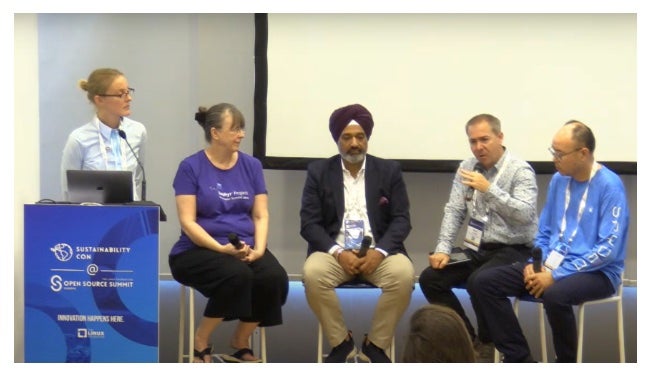
This blog originally ran on the LF Energy website. For more content like this, click here.
Open Source Summit Europe 2023 brought together a panel of experts to explore the intersection of open source technology and the United Nations Sustainable Development Goals (SDGs). Moderated by Anna Hermansen of Linux Foundation Research, the panel featured Kate Stewart from the Linux Foundation, Sumer Johal of the AgStack Foundation, Chris Xie representing Futurewei, and Matthew Sandoe from OS-Climate. The discussion shed light on how open source initiatives are contributing to the pursuit of sustainability and climate action.
Open Source as a Catalyst for Sustainability
The panel emphasized how open source technology serves as a powerful catalyst for sustainability initiatives. Open source solutions are collaborative, adaptable, and transparent, making them an ideal fit for addressing complex global challenges like the SDGs.
Zephyr’s Role in Sustainable Solutions
Kate Stewart highlighted Zephyr, an open source project that plays a crucial role in creating energy-efficient, remote, and resource-constrained devices. Zephyr is employed in various applications, from agricultural monitoring to renewable energy, and even tracking wildlife in remote areas, such as Scandinavian reindeer.
AgStack and Agriculture’s Sustainability
Sumer Johal discussed the AgStack Foundation’s mission to transform the agricultural sector by leveraging open source technology. Agriculture employs half of the world’s labor force and consumes a significant portion of freshwater. AgStack aims to address these challenges by creating open source solutions for data-sharing, monitoring, and improving agricultural efficiency.
Open Data’s Vital Role
The panel stressed the importance of open data in advancing sustainability. In particular, open data is crucial in agriculture, where precise information about soil moisture, temperature, and crop health can lead to more efficient farming practices. Open source technology facilitates the sharing of this valuable data for the greater good.
Collaboration and Pre-Competitive Stages
The experts highlighted the significance of collaboration at the pre-competitive stage of open source projects. By establishing common standards and codes before reaching competitive phases, open source initiatives can accelerate progress and foster innovation in sustainability.
Role of Commercial Providers
While open source projects thrive on collaboration, commercial providers can play a significant role in supporting these initiatives. Companies can engage with open source communities, hire contributors, and invest resources to advance sustainability-focused projects.
Meshing Data
Matthew Sandoe discussed the concept of a data mesh architecture for handling large-scale data aggregation and sharing. This approach, which federates data from multiple sources rather than centralizing it, has the potential to address biodiversity and nature crises by providing a blueprint for open source collaboration.
Freedom in Open Source
Chris Xie emphasized the importance of understanding that open source does not mean everything is free. It’s about freedom of operation and freedom of choice. Open source solutions empower individuals and organizations to control and adapt technology to their needs.
Engagement and Mentorship
The panel encouraged individuals to get involved in open source projects, whether as developers, advocates, or contributors. They recommended seeking mentorship within these communities and attending meetups and discussions to foster collaboration and knowledge-sharing.
[embedyt] https://www.youtube.com/watch?v=K9h4lNOktXo[/embedyt]